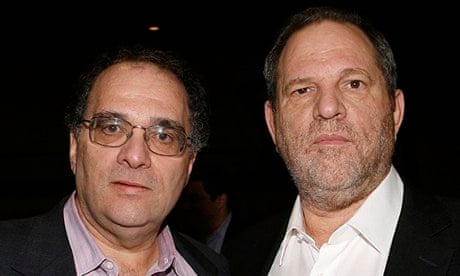Never say never. In one of the most remarkable turnabouts in the recent corporate history of the film industry, Weinstein Company co-chairs Harvey and Bob Weinstein are to go into business with Miramax, the legendary indie outfit they set up and were outbid when they tried to repurchase it in 2010.
Now it has emerged that the Weinsteins have signed a co-production and co-distribution agreement with Miramax, which is owned by investment companies Qatar Holding and Colony Capital.
The deal specifically includes new works developed from Miramax's extensive back catalogue – possible future projects cited include TV series based on Good Will Hunting and Flirting with Disaster (the latter directed by David O Russell and starring Ben Stiller in 1996), and possible sequels or spinoffs for the likes of Swingers and Shakespeare in Love.
Any films the two companies make together will be released in the US by the Weinstein Company, with Miramax retaining rights to sell the films overseas.
Miramax was set up by the Weinsteins in 1979 (named after their parents Miriam and Max) and swiftly became the dominant player in the 1980s and 90s US independent cinema scene – first as a distributor for films such as Errol Morris's The Thin Blue Line and Steven Soderbergh's Sex Lies and Videotape, and subsequently as a producer, with The English Patient and Quentin Tarantino's Pulp Fiction. Miramax also successfully brought large numbers of overseas art films to US cinemas, including Cinema Paradiso, The Double Life of Veronique and Farewell My Concubine.
Miramax maintained a high-public profile thanks to the Weinstein brothers' PR gifts (with Harvey being the public face), and it was bought by Disney for $60m (£37m) in 1993, providing a cash infusion for the company while the Weinsteins remained in charge. However, they left Miramax in 2005 shortly after Disney refused the company permission to distribute Michael Moore's anti-George Bush documentary Fahrenheit 9/11.
Disney then put the company up for sale in 2010, with Qatar and Colony outbidding the Weinsteins to buy the company for a reported $700m (£430m). Though they were reported to be furious at the time, the Weinsteins have now found a way to regain a measure of control over the company that is clearly dear to their heart.
In a joint statement, Harvey and Bob Weinstein said: "To have the Miramax banner fly once again is a dream come true for all of us."
And in an enterprising spin, the Weinsteins also issued a statement from their mother, Miriam: "Over the years Bob and Harvey have never let me talk although I would have done better than them, after all I am a Jewish mother … No one would be happier than Harvey and Bob's late father, Max."










Comments (…)
Sign in or create your Guardian account to join the discussion